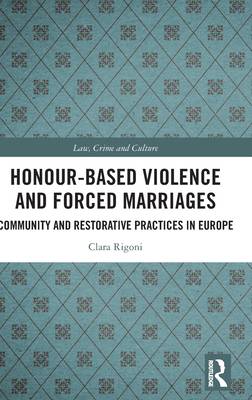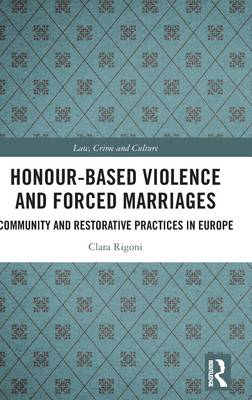
- Retrait gratuit dans votre magasin Club
- 7.000.000 titres dans notre catalogue
- Payer en toute sécurité
- Toujours un magasin près de chez vous
- Retrait gratuit dans votre magasin Club
- 7.000.0000 titres dans notre catalogue
- Payer en toute sécurité
- Toujours un magasin près de chez vous
Honour-Based Violence and Forced Marriages
Community and Restorative Practices in Europe
Clara RigoniDescription
In the last 20 years, the related phenomena of honour-based violence and forced marriages have received increasing attention at the international and European level. Punitive responses towards this type of violence have been adopted, including ad hoc criminalisation and legislation containing direct references to the concepts of honour, culture, and tradition. However, criminal law-based responses present several shortcomings and have often disregarded the specific needs that victims of such crimes might encounter. This book examines the possibility of using alternative programmes to address cases of honour-based violence and forced marriages. After reviewing previous existing literature, it presents new empirical data. Introducing a case study from the United Kingdom, the book recalls the debate on Sharia Councils and the Muslim Arbitration Tribunal, but examines instead other community-based secular programmes. By comparison, a study from Norway on the work of the National Mediation Agency and the so-called Cross-Cultural Transformative Mediation model is investigated as part of a larger multi-agency approach. Ultimately, in an attempt to reconcile pluralism and the rule of law, the book proposes effective ways to tackle honour crimes based on cooperation and individualisation of the proceedings, and capable of improving women's access to justice and reducing secondary victimisation.
The book will be essential reading for researchers and academics in Law, Criminology, Sociology, and Anthropology and for policy-makers and practitioners working with honour-based violence cases.
Spécifications
Parties prenantes
- Auteur(s) :
- Editeur:
Contenu
- Nombre de pages :
- 276
- Langue:
- Anglais
- Collection :
Caractéristiques
- EAN:
- 9780367505974
- Date de parution :
- 12-08-22
- Format:
- Livre relié
- Format numérique:
- Genaaid
- Dimensions :
- 156 mm x 234 mm
- Poids :
- 576 g

Les avis
Nous publions uniquement les avis qui respectent les conditions requises. Consultez nos conditions pour les avis.






